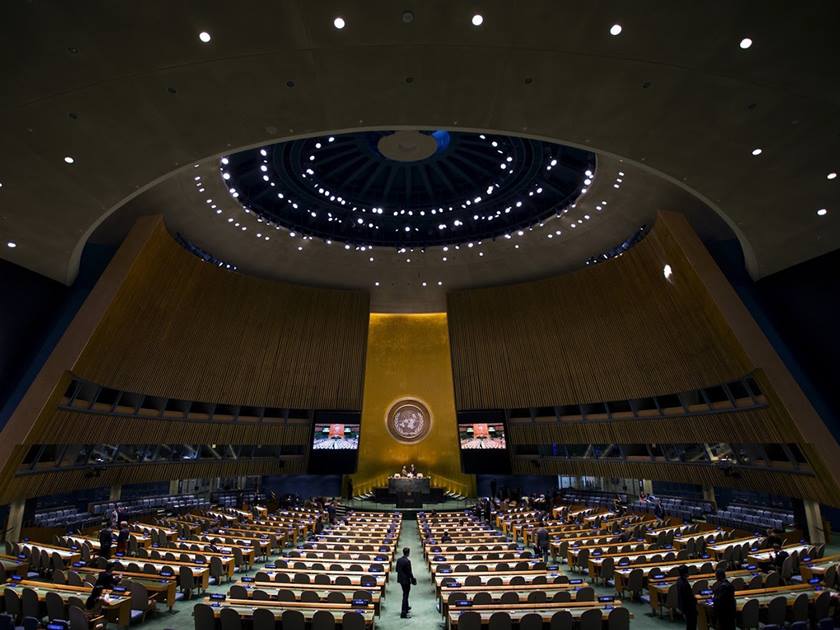Doha, September 15 (QNA) - Activities of the 77th session of the United Nations General Assembly will begin on Sept. 19th, amid growing economic challenges, especially since 2022 is considered an exceptional year full of economic challenges such as inflation, high energy and food prices, and signs of famine looming on the horizon in a number of countries, in addition to the increase in poverty, the accumulation of debts, the faltering of supply and supply chains due to the continued spread of COVID-19 virus, and geopolitical tensions and other issues that grip the global economy.
In face-to-face meetings in New York, leaders of member states are scheduled to discuss a package of cross-cutting and interrelated issues affecting people's lives and livelihood security, in addition to the progress made in achieving the Sustainable Development Goals adopted by the United Nations in 2015, most notably the eradication of poverty and hunger, health and education for all, access to clean water, and the provision of decent work within sustainable cities and communities.
Figures issued by parties related to world economic indicators all point towards the dominance of the economic file over the discussions of the sessions in the corridors of the United Nations in September.
Before the start of this year's session, the International Monetary Fund lowered its forecast for global economic growth for 2022 and 2023 because of uncertainty, predicating that global growth is likely to reach 3.2 percent this year, which is 0.4 percent lower than previous estimates, while the global economy is expected to grow by 2.9 percent in 2023, which is also lower than previous estimates by about 0.7 percent.
The Fund expected that inflation in developed countries will reach 6.6 percent and 9.5 percent in emerging and developing countries this year, which represents an increase in estimates by about 0.9 percent and 0.8 percent, respectively.
Food prices, which witnessed huge fluctuations this year, stabilized slightly after the resumption of grain exports through the Black Sea from Ukraine to international ports under an agreement between Turkey, Russia, Ukraine and the United Nations on July 22nd.
The Food and Agriculture Organization (FAO) had announced in early August that the food price index fell to 140.9 points in July of this year, a decrease of 8.6 percent from its levels in the previous June, and this is the fourth monthly decline in a row since it reached its highest levels earlier this year in the wake of the Russian military operation in Ukraine, noting that despite this, the indicator remains higher than it was in July 2021 by 13.1 percent.
In terms of the global monetary situation, the Federal Reserve intends to raise interest rates exceptionally during the next meeting of the monetary committee on Sep. 21, after two successive decisions to raise by 75 points, in an attempt to curb inflation and calm prices.
In the same context, economic issues were not missed by the European Union (EU), as it outlined, in a statement on July 18, what it called the European priorities for the 77th session of the United Nations, most notably the effects of the war between Russia and Ukraine, promoting sustainable development and human rights, supporting access to quality education, strengthening global security, health, combating climate change, and the formation of global digital programs.
Global oil prices jumped to their highest levels in March and April of last year, reaching $138 a barrel. The Brent benchmark price is still around $100 a barrel, and natural gas prices continued to rise to record levels, according to Title Transfer Facility for natural gas trading, which is based in Amsterdam. The price of gas rose by more than 6 percent to approach 316 euros per megawatt after remaining above 300 euros for two days, according to the latest data. The gas prices did not rise from this level except in the period immediately following the start of the war in Ukraine in late February, as prices reached a peak at that time of 345 euros.
Despite growing popular protests because of the increase in food prices, inflation and looming famine, countries are likely to continue implementing policies aimed at economic reforms, such as macroeconomic restructuring, raising interest rates to curb inflation, allocating greater resources for clean energy and combating climate change, as well as increasing investments in the energy sector to increase supply in the coming years.
Many countries have witnessed widespread popular protests against the impact of rising food prices and high inflation, as Sri Lanka was rocked by mass protests that erupted last March in response to the shortage in food, fuel, medicine and other basic materials. The situation was exacerbated by economic reforms such as deep tax cuts and debt service, which depleted the country's foreign exchange reserves. Lebanon also witnessed popular unrest due to the economic situation after the state debt approached 80 billion dollars. According to a report presented by Lebanese President General Michel Aoun recently, the public debt ratio reached 147 percent of the GDP estimated at about 54 billion dollars in the past year.
Professor of economics at Qatar University Dr. Rajab Al-Esmail said that the world is currently witnessing major transformations with economic dimensions that had an effect on the political data, pointing to the signs of economic recovery from the COVID-19 pandemic and the resulting closures and decline of economic activity.
Al-Esmail added, in his statement to the Qatar news agency (QNA) that the economic problems have affected the political stability of some developing countries, which prompted these countries to request more aid and loans from the World Bank and the International Monetary Fund (IMF), noting that these countries suffer from two aspects: first is the decline in the purchasing power of its currencies against the dollar and other foreign currencies, especially after the strength the US dollar gained from the continuous increase in interest rates, which limits its ability to obtain energy that requires foreign exchange, and the second is the rise in interest rates on loans, which increases the debt burden and its service. He added that this agenda and others will impose themselves strongly at the events of the UN General Assembly.
Chairman of the Qatar Association of Certified Public Accountants (QCPA) Dr. Hashim Al-Sayed commented that the economic priorities will be diverse and will impose themselves strongly on the table of meetings, adding that economic issues are intertwined and complex, and despite the intersection of the interests of countries, they will find themselves sharing common concerns and issues of common dimensions such as inflation crises, high living prices, energy and climate change. These issues will force presidents and officials to prioritize them in their agenda in the hope of reaching common solutions that reflect positively on their peoples.
He pointed out in a statement to the Qatar news agency (QNA) that the General Assembly meetings should move from describing and diagnosing challenges to presenting initiatives, solutions and recommendations that are applicable on the ground, in terms of the issues related to high energy prices and derivatives.
The General Assembly, established in 1945 under the Charter of the United Nations, occupies a central position as the main deliberative, policy-making and representative body of the United Nations. The General Assembly includes in its membership the193 member states of the United Nations Organization. It is the main representative organ of the United Nations for deliberation and policy-making, and each of the member states of the General Assembly has one vote. (QNA)


